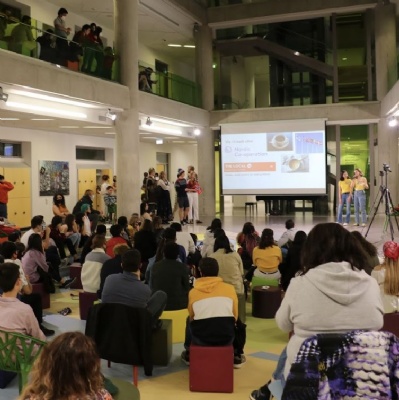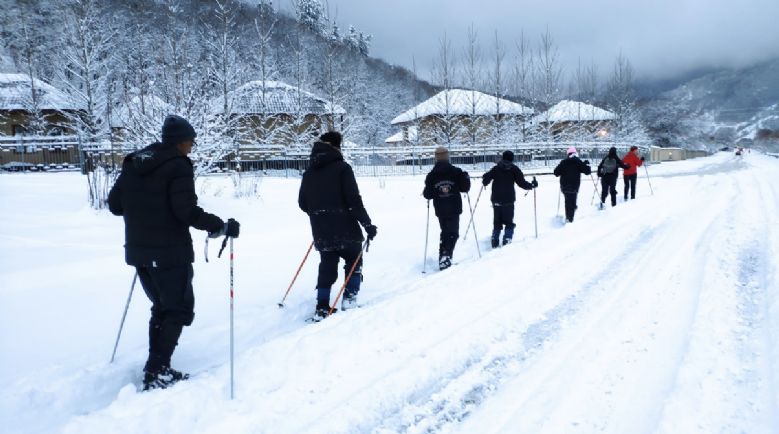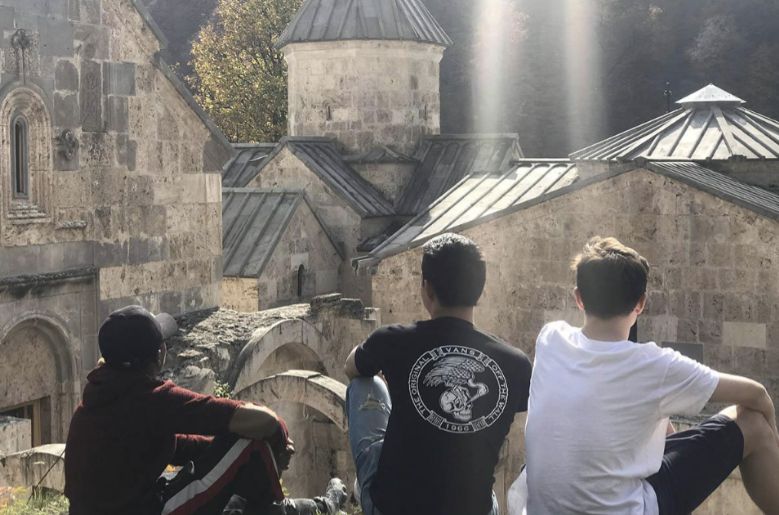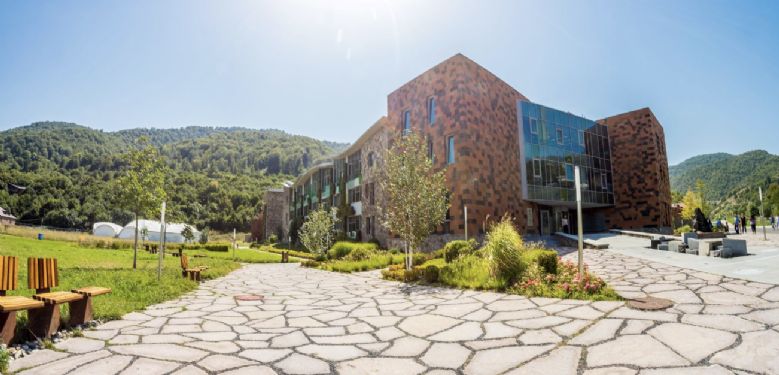In the Midst of a Global Conflict and Pandemic: Teaching for Peace and Sustainability at UWC Dilijan (Armenia)

In August 2020, our Belgian students Mica (UWC Dilijan, 2020-2022) and Ernest (UWC Dilijan, 2019-2021), both left for their UWC experience. As all students departing around that time, Mica and Ernest were faced with the challenges of travelling and studying in another country in the midst of a global pandemic. At UWC Dilijan, however, these challenges were topped up with the outbreak of a global conflict in September 2020: the Nagorno-Karabakh conflict. We have talked with Mica and Ernest, the school director of UWC Dilijan, and a Belgian board member, to see how they look back at this challenging period, and how they found strength within the community and each other to continue making education a force to unite peoples, nations, and cultures, for peace and a sustainable future.
Ernest and Mica: What when the school staff is leaving for the front?
When Ernest got a scholarship for UWC Dilijan, he initially knew nothing about Armenia, but soon after his arrival, he got intrigued by its history and later, during school trips, by its charm. Mica was in a very similar position; she initially even had to google where Armenia was located. Nevertheless, she cried tears of joy when she realised where she was going. When she arrived, she was certainly not disappointed, and she enjoyed discovering and learning more about the cultural differences between Armenia and Belgium.
Ernest was able to discover the country before the Covid-19 pandemic impacted his experience: "Armenia is a country very clearly marked by the passage of communism. This leads to very interesting architectures. I am quite fascinated by these peculiar monuments. Before the lockdown, we made several trips with our school and I have fond memories of our visit to Gyumri, a really nice and cute town with a long history and many historical buildings." Mica, on the other hand, who arrived in the middle of it all, did not get to see as much from the country as she might have initially hoped. Nevertheless, she remains positive, and feels lucky to be where she is right now: "With our school at the edge of a nature reserve, we are maybe in one of the most beautiful parts of Armenia."
But, whether they initially knew something about Armenia or not, the Nagorno-Karabakh conflict almost forced them into a crash course on Armenian history. While going to school in the midst of a global pandemic, they were now also going to school in a country at war. Neither of them ever expected things would turn out like this, or as Mica phrased it: "I came to UWC with a view to learn how to build peace but I didn't really expect to learn about it while entering a conflict zone. In fact, there is a difference between knowing that there is a war and realising that there is a war. First, I started receiving many calls from my relatives who were panicking while watching the news, but at school everything seemed calm and business as usual, apart from the staff showing us the procedures to follow in case the air raid alarm went off. For me, things started becoming real when I saw friends from affected countries running out of the classroom as soon as they got a phone call or when I saw some students crying while reading the news. It was the constant tension, fear and uncertainty all over the campus that really took me by surprise."

Ernest mentioned that their Outdoor Education Instructor even left for the front, together with many relatives of students and staff. Mica added: "We knew we could not do much about it, but we tried to do whatever we could, like, for example, cooking or donating clothes for the refugees that were affected by the conflict. And amongst ourselves, I could say that we had a very intensive experience of the UWC mission: “UWC makes education a force to unite people, nations and cultures for peace and a sustainable future [...]”. My experiences of the last few months have changed my view on this sentence. Peace now seems to me even more complicated to build but also much more necessary. There is no one way and no miracle recipe to build a healthy, fair and lasting peace, otherwise we would have achieved it long ago. Peace, such as the one I seek through the UWC movement, is not the absence of conflict. It is a daily practice to treat each other with respect in order to ensure stability in social cohesion and to meet the vital needs and protection of everyone. Experiencing this unity between Turks, Russians and Armenians living on the same campus while their countries are torn apart makes me believe that through education and communication we will be able to come closer to what we call peace."
Peace, such as the one I seek through the UWC movement, is not the absence of conflict. It is a daily practice to treat each other with respect in order to ensure stability in social cohesion and to meet the vital needs and protection of everyone. Experiencing this unity between Turks, Russians and Armenians living on the same campus while their countries are torn apart makes me believe that through education and communication we will be able to come closer to what we call peace
Director Gabriel Ernesto Abad Fernandez: Proud of his students for putting the UWC
spirit in practice.
Luckily director Gabriel Ernesto Abad Fernandez has a long history of working in UWC colleges around the world. His fifth year of leading UWC Dilijan will be remembered as an extreme test of resilience, but also of finding out on how much support and help the school can rely on, from staff, students, parents, authorities and other supporters. We had a talk with him about a year that he will certainly always remember!
2020 was bound to be a year full of parties at UWC Dilijan: the college was celebrating its five-year anniversary throughout the academic year. But things didn’t go exactly according to plans, did they?
"Not exactly, indeed. First, like everybody around the world, we were hit with the news of the Covid-19 pandemic. The graduation ceremony for 2020 was therefore organised spontaneously in March. We had to rethink everything and we organised for parents to follow it online. This was our way to demonstrate resilience and solidarity and it became a real celebration of the UWC Dilijan spirit, alive even in the virtual world! After that, all the staff joined in an effort to dispatch our students safely back to their families. Around 25 students had to remain on campus as they could not join their families either because of political or health situations in their own countries or due to other circumstances."
Luckily the UWC Dilijan campus is not the worst place to be stuck at. On the edge of a nature reserve, with 8 hectares to host the 200 students, on-campus sport facilities including a swimming pool, a students’ kitchen garden … many of us have been locked down in less comfortable places!
"Yes, we are very proud of our beautiful campus, which is purpose-built and in a most beautiful part of a fascinating country, at a crossroads of Europe and Asia along the ancient Silk Route. However, we had to put systems in place for our campus to be an example of good practices in relation to COVID-19. We also had to regroup and upscale online teaching to be able to continue classes online and ensure that students could graduate and be accepted to universities. We knew that some of our students were in difficult situations at home too and sometimes had to resort to extreme solutions to find stable internet connection or a quiet place to study. Nevertheless, by mid-April we were settled in the new learning and teaching routine and we could start thinking of scenarios for the future of our young school. To be honest, we were a bit worried that students might not be coming back and that this was going to be a sour ending to all the work we had done in establishing our school as a player in international education in the region and globally."
Many students could probably not wait to come back to Dilijan. They would have come by foot, if they would have had to.
"I think that our extra efforts to keep communication going helped a lot. Meanwhile, we were going through great lengths to reorganise our campus. We received precious help from one of the parents who happens to be an epidemiologist. The challenge was to get the support of the Ministry of Health and Ministry of Foreign Affairs in Armenia to validate that the campus was COVID-ready and that visas for our students would be issued even if the country was closed. It was great to see our students come back and bring life to the campus again. Also the new students came. And then came the war."
Are you sure it was a good idea to start an international school close to a front line?
"Well, in practice, the school is 400 kilometers from Nagorno-Karabakh, so you could say that we are at a safe distance. You might know that this conflict between Armenia and Azerbaijan is a long story. The present conflict began in 1988 when the Karabakh Armenians demanded that Karabakh be transferred from Soviet Azerbaijan to Soviet Armenia as the Soviet Union was collapsing. A ceasefire was signed in 1994, and since then there were frequent small-scale exchanges of fire on the border. This time, however, the situation was extremely serious.
Apart from concerns for the safety of our students and intense communication with the student, staff and parent community to reassure them that this conflict would not affect UWC Dilijan being 400 km away, we had to cope with the politics of it. We have 10% of the student body who are Armenian and 45 out of about 70 staff are Armenian. We are not a regular international school for expatriate children, we are a UWC school with “deliberate diversity” of students and teachers learning through understanding that other people can hold legitimate differing views. And while we felt for our staff, students and Armenian friends, we had to try and maintain a balance.
It made me proud that our Armenian students, without being prompted, initiated a session on explaining the conflict to their fellow students. Despite the emotional atmosphere, the students were very measured in their presentations and the subsequent discussions. Our Turkish students sent a message of solidarity to the Armenian community which was well received. We then concentrated on doing something positive—helping internally displaced people (IDPs) in Dilijan, raising money for the children affected by the war and making sure that this situation was a learning experience for us all. To me this is what a UWC education is about—international and intercultural understanding and mutual responsibility and respect. Only this type of engagement can bring the peaceful solutions we all wish for not only in this conflict but elsewhere on the planet."
To me this is what a UWC education is about—international and intercultural understanding and mutual responsibility and respect. Only this type of engagement can bring the peaceful solutions we all wish for not only in this conflict but elsewhere on the planet.
Board member Pierre Gurdjian: turn the suffering from the past into a force for the future.
 When talking about UWC Dilijan, it never takes long before the names of Ruben Vardanyan and Veronika Zonabend are mentioned as major driving forces behind this school. But amongst the founders and board members of the school we also find a Belgian with, on top of Armenian roots, extensive experience in entrepreneurship, education and philanthropy. We thought that Pierre Gurdjian would be an ideal person to tell us how the idea was born to create a UWC college in Dilijan, Armenia.
When talking about UWC Dilijan, it never takes long before the names of Ruben Vardanyan and Veronika Zonabend are mentioned as major driving forces behind this school. But amongst the founders and board members of the school we also find a Belgian with, on top of Armenian roots, extensive experience in entrepreneurship, education and philanthropy. We thought that Pierre Gurdjian would be an ideal person to tell us how the idea was born to create a UWC college in Dilijan, Armenia.
How does one start with thinking about setting up a new UWC college?
"For us, it all started in 2001, when a group of prominent Armenians created a platform called Armenia 2020, and invited all Armenians within the country and abroad to think about the future of Armenia. One element identified as crucial for the development in the country was education, obviously, as it is for the development of every country. More specifically, the idea was developed to stimulate an open and progressive kind of education and to start a flagship institution to put that idea into practice. We soon identified UWC as an inspiring model that both offered a model with a proven track record, an existing network to rely on, and a spirit that allowed for new interpretations too. The UWC model was developed in the ‘60s, during the Cold War, and times have changed since then, together with our ideas about education. We wanted UWC Dilijan to be a new member of the UWC family that offers the conditions to explore innovation within the UWC movement as well as within Armenia. As to the first, our board member Veronika Zonabend is very much involved in the international UWC movement and guarantees a close link between UWC Dilijan and the international context. As to Armenia, while UWC Dilijan is the only international school in the country and around, there are other interesting schools in the area. With them, the school already cooperates on developing and spreading new approaches to education and we hope to develop the school even more as a hub for exchanging experience about innovative education for the whole of Armenia."
What makes UWC Dilijan stand out from other UWC colleges?
"Again, we try to make a link with both the Armenian context and the international context as it is today. A key word for both of these axes is humanitarian action, and beyond that, humanitarianism as an attitude. Above all, we tried to integrate the humanitarian thinking into the school activities. In practice, we offer the students many possibilities to get involved in activities that help those who are in need in one way or another. Of course, this is inspired by the Armenian experience of genocide, which is a memory of great suffering to Armenians, but by transforming past suffering into a source of inspiration to wish the world a better future, we can move forward. It is in this spirit also that the people who are the driving force behind UWC Dilijan have set up the biggest humanitarian prize in the world, the Aurora Prize, on behalf of the survivors of the Armenian Genocide and in gratitude to their saviours. The prize is awarded to someone who in our own time helps the most helpless and destitute. With our experience from the past, we try to be relevant in today’s world. Just like we encourage the students of UWC Dilijan to participate in volunteer work in the community around the school and set up activities in the community centre that we also created outside the school in the centre of Dilijan itself. We realise that the school attracts a precious group of young people, at an important moment in their lives, that will go on and be leaders in whatever environment they will move on to afterwards. We want to nurture that seed of humanitarianism in them. As much as we want them to leave with a special place for Armenia in their hearts for the rest of their lives."
Still, most people who hear about Armenia, have to check on the map where to locate this country!
"We know that, but that is part of the challenge. Once people get to know the place, they are totally charmed and convinced. The buildings are impressive and are a welcome addition to this place with a rich history, well known as an artist colony and a lovely spa town in Soviet times, but hit hard by the post- Soviet reality. Now the school offers more than hundred direct jobs, and indirectly even more jobs for hotels, restaurants and other services because of the many visitors related to the school. There is now again a tourism development centre in Dilijan and people rediscover this beautiful part of Armenia. We hope to spread ideas about the possibilities that exist for the future of Armenia."
We realise that the school attracts a precious group of young people, at an important moment in their lives, that will go on and be leaders in whatever environment they will move on to afterwards. We want to nurture that seed of humanitarianism in them. As much as we want them to leave with a special place for Armenia in their hearts for the rest of their lives.

